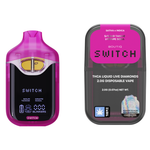The Benefits of Kratom
Kratom (
Mitragyna speciosa) is a tropical tree native to Southeast Asia, where it has been used for centuries in traditional medicine. More recently, kratom has gained popularity for its potential benefits, which range from pain relief and mood enhancement to energy boosts and assistance with opioid withdrawal.
This guide explores the most well-known benefits of kratom, how it works in the body, and why many people are incorporating it into their wellness routines.
Pain Relief
One of the most common reasons people use kratom is for pain management. The plant contains two powerful alkaloids, mitragynine and
7-hydroxymitragynine, which interact with opioid receptors in the brain. This process reduces pain perception while offering a more natural alternative to pharmaceutical opioids.
Many kratom users report relief from chronic pain conditions, including arthritis, fibromyalgia, migraines, muscle soreness, and nerve pain. Surveys suggest that over 90% of kratom users take it primarily for pain relief. Its analgesic effects vary depending on the strain and dosage, with red vein kratom being the most popular for pain management.
Energy and Focus Enhancement
At low doses, kratom acts as a stimulant, increasing energy levels and promoting mental clarity. This stimulating effect has made it a popular choice for workers and students who need to stay productive for long periods.
- Boosts physical endurance – Traditionally used by laborers in Southeast Asia to reduce fatigue.
- Enhances focus and concentration – Many users compare its effects to caffeine, helping with cognitive performance.
- Improves motivation – Users report feeling more alert and ready to tackle daily tasks.
While kratom can provide an energy boost, higher doses tend to have a sedative effect, so dosage plays a key role in achieving the desired outcome.
Mood Enhancement and Anxiety Relief
Kratom is widely used for mood support and stress relief. Some users claim that it reduces anxiety, depression, and PTSD symptoms by promoting relaxation and emotional balance. This effect may be due to kratom’s ability to influence serotonin and dopamine levels, which are neurotransmitters responsible for happiness and well-being. You can find more information on this at
Johns Hopkins Medicine.
Surveys indicate that nearly 67% of kratom users take it for anxiety relief, while 65% report improvements in symptoms of depression. Many users describe an increased sense of optimism, reduced social anxiety, and an overall more positive outlook after consuming kratom.
Support for Opioid Withdrawal
Kratom has gained attention as a potential aid for opioid withdrawal because it interacts with the same receptors that opioids do—without causing the same level of dependence or respiratory depression. Many people struggling with opioid addiction use kratom to help manage withdrawal symptoms, including nausea, muscle cramps, insomnia, and anxiety.
A study found that 41% of kratom users take it to reduce opioid withdrawal symptoms, with 35% successfully remaining free from opioids or heroin for over a year. While kratom is not an FDA-approved treatment for addiction, many users have found it helpful in easing the transition away from stronger opioids.
Digestive Health and Diarrhea Relief
In traditional medicine, kratom has been used to support digestive health and treat conditions like diarrhea. The alkaloids in kratom interact with opioid receptors in the gut, which can slow bowel movements and help regulate digestion.
People suffering from chronic diarrhea, irritable bowel syndrome (IBS), or other digestive issues may find relief by using kratom in moderation. However, high doses can lead to constipation, so users should monitor their intake to maintain a healthy balance.
Appetite Suppression and Weight Management
Some people use kratom as a natural appetite suppressant to help with weight control. While research on this benefit is limited, many users report that kratom helps reduce cravings and overeating.
- Reduces frequent snacking – Many users say kratom helps them feel full longer.
- Supports intermittent fasting – Some find it easier to maintain a fasting routine with kratom’s appetite-suppressing effects.
- May contribute to weight loss – By decreasing overall food intake, kratom may help with calorie control.
While kratom may support weight management, its effects vary depending on the strain and individual metabolism.
Antioxidant and Anti-Inflammatory Properties
Some studies suggest that kratom contains antioxidant compounds that help protect the body from oxidative stress. Antioxidants play a key role in reducing inflammation, supporting immune function, and preventing cellular damage.
People suffering from chronic inflammation, arthritis, or autoimmune conditions may benefit from kratom’s anti-inflammatory effects. While more research is needed, early findings suggest that kratom’s alkaloids may have neuroprotective properties, making it a promising area of study for long-term health support.
Libido and Sexual Performance Enhancement
Kratom has been used traditionally as a natural aphrodisiac, and many users claim it helps improve libido and sexual stamina. Some potential benefits include:
- Increased blood flow – May improve endurance and overall performance.
- Reduced anxiety – Can help those with performance-related stress feel more relaxed.
- Enhanced mood – A positive mental state often contributes to improved intimacy.
While scientific studies on kratom’s effects on sexual health are limited, anecdotal evidence suggests that some strains, particularly white and green vein kratom, may enhance libido.
Potential Support for Blood Sugar Control
Preliminary research suggests that kratom may have a positive impact on blood sugar regulation, making it a potential aid for diabetes management. Some users report experiencing fewer blood sugar spikes after consuming kratom, and researchers believe its alkaloids may improve insulin sensitivity.
Although these effects require further scientific validation, kratom’s role in blood sugar control is an interesting area for future studies.
Mental Clarity and Cognitive Support
Some kratom users believe that it helps with mental clarity, concentration, and cognitive performance. While the mechanisms behind this effect are not fully understood, kratom’s stimulating properties at low doses may enhance brain function by increasing focus and motivation.
This benefit makes kratom a popular choice for:
- Students looking to improve focus during study sessions.
- Professionals who need an extra boost in mental energy.
- Individuals with brain fog who want more mental sharpness.
Although more research is needed, many users report that kratom helps them stay mentally alert without the jitteriness of caffeine.
Additional Benefits, Considerations, and FAQs About Kratom
In Part 1, we covered the primary benefits of kratom, including pain relief, energy enhancement, mood support, and opioid withdrawal assistance. While these are some of the most well-known effects, kratom has other potential benefits, along with certain considerations and precautions that users should be aware of.
This section will explore additional potential benefits, discuss safety and responsible use, and answer some of the most frequently asked questions about kratom.
Kratom for Sleep Support
At higher doses, kratom can act as a natural sedative, making it helpful for individuals struggling with insomnia or restless sleep. Some users report that kratom:
- Helps them fall asleep faster and stay asleep longer.
- Reduces nighttime anxiety and racing thoughts.
- Provides a sense of calm and relaxation before bed.
While red vein kratom strains are most commonly associated with sedative effects, some users find that moderate doses of green vein kratom also help promote sleep without excessive drowsiness. However, excessive use of kratom for sleep can lead to tolerance and dependency, so it’s best used occasionally rather than nightly.
Edibles and gummies that contain hemp cannabinoids can also help with sleep! View our collection
here.
Social Anxiety Reduction and Enhanced Sociability
Some users find that kratom reduces social anxiety and makes them feel more comfortable in social settings. This effect is often compared to the way alcohol helps people relax and socialize, but without the impairment or hangover.
- Low to moderate doses may increase confidence and reduce shyness.
- Users report feeling more engaged and talkative in social situations.
- Unlike alcohol, kratom does not typically cause mental fogginess or lack of coordination.
For those who experience mild to moderate social anxiety, kratom may provide a natural way to feel more comfortable in group settings.
Potential Immune System Support
Some research suggests that kratom may have immune-boosting properties, although studies are still in early stages. The alkaloids in kratom have shown antioxidant and anti-inflammatory effects, which could contribute to overall immune system health.
While not a replacement for a healthy diet and lifestyle, kratom’s antioxidant properties may help:
- Reduce oxidative stress, which is linked to chronic diseases.
- Support the body’s natural defense mechanisms.
- Assist in recovery from inflammation-related illnesses.
More scientific studies are needed to fully understand kratom’s role in immune health, but early findings are promising.
Cognitive Support and Mental Clarity
Some kratom users claim that it enhances cognitive function, including memory, mental clarity, and problem-solving ability. The stimulating effects of white and green vein kratom are particularly popular among students, professionals, and those with mentally demanding jobs.
- Some users experience better focus and concentration when using kratom.
- It may help reduce brain fog and mental fatigue.
- Unlike caffeine, kratom does not typically cause jitters or crashes when taken in moderation.
While kratom is not a cognitive enhancer in the way that nootropics are, its energy-boosting and mood-enhancing properties may contribute to improved mental performance.
Considerations for Responsible Kratom Use
While kratom has many potential benefits, responsible use is key to avoiding negative side effects or dependency. Like any natural supplement, kratom should be used in moderation and with awareness of individual tolerance levels.
Best Practices for Using Kratom Safely
- Start with a low dose (2-3 grams) to gauge how your body reacts.
- Avoid daily use to prevent tolerance and dependence.
- Stay hydrated, as kratom can have mild dehydrating effects.
- Use high-quality, lab-tested kratom to ensure purity and safety.
Potential Side Effects of Kratom
- Nausea and dizziness (especially at high doses).
- Dry mouth or mild dehydration.
- Constipation if taken frequently in high doses.
- Dependency with prolonged excessive use.
While kratom is considered safer than opioids and many pharmaceuticals, long-term studies on its safety are still ongoing. Responsible use is crucial for maximizing benefits while minimizing risks.
Frequently Asked Questions (FAQs) About Kratom
Is Kratom Safe?
Kratom is generally considered safe when used in moderation. However, excessive or long-term use can lead to tolerance, dependency, and withdrawal symptoms. Purchasing lab-tested kratom from reputable sources helps ensure purity and reduce the risk of contamination.
Does Kratom Cause Addiction?
Kratom has the potential for dependency, especially when used daily in high doses. While it is not as addictive as opioids, some users experience withdrawal symptoms such as fatigue, irritability, and mild flu-like symptoms when quitting after prolonged use.
To avoid dependency:
- Use kratom in moderation.
- Take breaks between use.
- Rotate different strains to prevent tolerance buildup.
Can Kratom Be Used for Opioid Withdrawal?
Yes, many people use kratom as a natural aid for opioid withdrawal. It interacts with opioid receptors but does not cause severe respiratory depression like traditional opioids. While kratom may help manage withdrawal symptoms, it is important to use it under medical supervision if possible.
How Long Does Kratom Stay in Your System?
Kratom’s effects typically last between 3 to 6 hours, but its alkaloids can remain in the body for up to 24 hours. The detection window for kratom in drug tests depends on factors like:
- Frequency of use (occasional users clear it faster than daily users).
- Metabolism and body composition.
- Hydration and diet.
Standard drug tests do not typically screen for kratom, but specialized tests can detect it in urine for up to 7 days in heavy users.
Can You Overdose on Kratom?
There have been no confirmed cases of fatal kratom overdoses when used alone. However, mixing kratom with other substances (such as alcohol, opioids, or benzodiazepines) can increase the risk of serious side effects.
Signs of taking too much kratom include:
- Extreme drowsiness
- Nausea and vomiting
- Increased heart rate
- Loss of coordination
Moderation is key to ensuring safe and beneficial use.
What’s the Best Way to Take Kratom?
Kratom can be consumed in several ways, with powder, capsules, and teas being the most popular. Each method has its advantages:
- Kratom powder – Fast-acting, but has a strong taste.
- Kratom capsules – Convenient, with no bitter taste.
- Kratom tea – A traditional method with milder effects.
Final Thoughts on Kratom’s Benefits and Use
Kratom offers a wide range of potential health benefits, including pain relief, increased energy, mood enhancement, and opioid withdrawal support. While many users find kratom helpful, responsible use is essential to avoid dependency and side effects.
If you’re considering trying kratom, remember to:
- Start with a low dose and adjust as needed.
- Use it responsibly and avoid excessive use.
- Buy from reputable sources to ensure quality and safety.
Kratom continues to be a subject of scientific research and debate, but for many, it remains a valuable natural remedy for a variety of conditions.

















